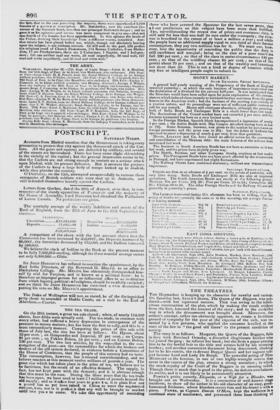THE TEA TRADE.
On the 20th instant, a great tea sale closed ; when, of nearly 114,000 chests, four-fifths were actually sold. The tea-trade, in common with every other, had suffered a heavy depression in consequence of the pressure in money matters ; but has been the first to tally, and this in a most extraordineey manner. Comparing the prices of this sale with those of July lust, the rise has been as follows. On Hyson, about 12 per cent. ; on Gunpowder and Imperial, 27 per cent. ; on Congo, $1 per cent. ; on Fokien Bohea, 55 per cent.; and on Canton Bolles, 190 per cent. The two last articles, by the way—that is, the con- sumption of the poor—are the commodities for which the brokers and dealers of the old system declared, in evidence before a Committee of the House of Commons, that the people of this country had no taste. The consumption, however, has iecreased notwithstanding, and we believe reaches at this moment twelve millions of pounds a yea;'. The great rise which has taken place in the price of tea, we believe not to be factitious, but the result of an effective demand. The supply, in fact, has not kept pace with the demand; and it is obvious enough that this must be the case. During the three years that the tea trade has been open, we have used at least C) millions of pounds beyond the old Supply; and as it takes four years to gmow t .a, it is plain that not a pound has as yet been raised in China to meet the augmented con:um, Con, nor is it probab'e that any will be brought to market until two yea s to come. We take this opportunity of reminding those who have perused the Spectator for the last seven retire, tied a 1 our predictions Ott this subject have been more than fulfilled. Tea, notwithstanding the recent rise of prices and enormous duty, is still sold for less than one-half its cost under the monopoly; the revs. nue is benefited to the extent of at least a million a year ; and while the people have an additional supply equal to.one.third of their former consumption, they pay two millions less for it. We must not, how- ever, lose the opportunity of' reminding the public that the duty is still exorbitant and unequal ; being on the cost of a poor mates tea full 230 per cent.; on that of the class in easier circumstances 140 per cent. ; on that of the middling classes 85 per cent,; on that of the gentry about 70 per cent. ; and on that of the wealthy and luxurious not more than 50. This is not a kind or degree of taxation which any free or intelligent people ought to submit to.


























 Previous page
Previous page